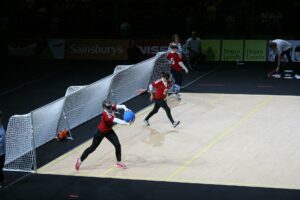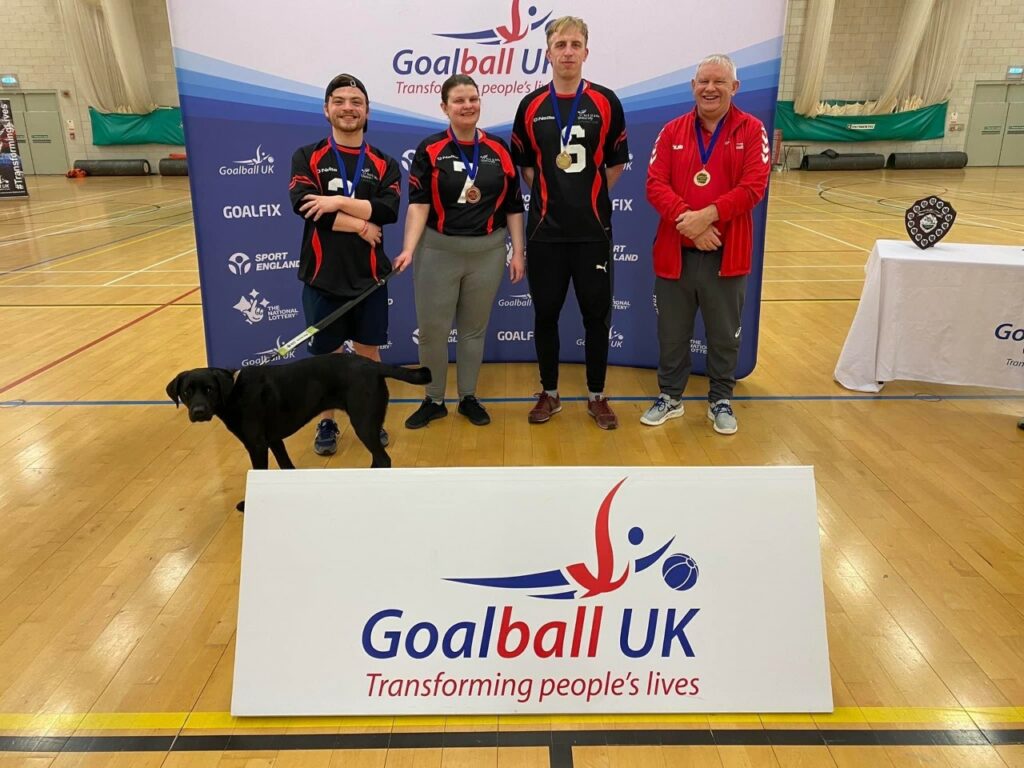Institute for Social Justice student intern Emily Howarth talks to YSJ staff and students about the different benefits of volunteering.
Every year, YSJ students gain incredible experiences through volunteering. Yet, while there are many wonderful benefits to volunteering, Lewis Wombwell, the volunteering co-ordinator at YSJ, says that now it seems tougher than ever to get people motivated.
For this blog Lewis put me in touch with two student volunteers, Heidi Rochester (3rd year Physical Education and Sport Coaching) and Aaron Mitchell (2nd year Physical Education and Sports Coaching), who regularly volunteer at a local school, helping out with a sport called Goalball. Together we discuss why they volunteer and potential approaches to getting people involved in their local community.
Goalball: Disability Sport, Inclusion and Volunteering
Goalball was invented after the Second World War, for soldiers who had lost their sight. It was created with the intention of including athletes with varying degrees of blindness, but anyone can play. It is played in two teams of three, with each player wearing a pair of padded, blacked out eyeshades. The court is marked out with string so the players can feel where they are, and the ball has a bell inside of it which produces noise.

Heidi describes it this way: ‘Everybody wears blindfolds, and you lob the ball in one direction, hoping to score a goal – with someone in front of the goal wearing a blindfold, hoping to stop it.’
York St John University is a centre for Goalball, and Team GB actually train on our campus! Student volunteer Aaron saw Goalball at the Paralympics and thought it looked interesting, so he was already playing the sport when the University sent an email around asking for volunteers to help run Goalball events in schools.
Aaron said that part of his initial motivation was the opportunity to work with people with visual impairments, and to learn more about disability sports. He wanted to develop his personal skills, and be able to work and communicate effectively with a wide range of different people. Heidi volunteers at a school specifically for those with learning and physical disabilities, and says all of the students love participating. Both student volunteers are passionate about creating more opportunities for people with disabilities to get involved with sport and because of its inclusive nature, Goalball is a great way to get people playing.
For Heidi, another reason she got involved was because she remembers volunteers that made her sporting experiences better as a kid. She told me she is ‘quite happy to give that experience to someone else, and hopefully they will do that as well in the future.’
For Aaron, Goalball is something that he is definitely pursuing after university. He started playing as a hobby, and through volunteering was able to gain more experience and skills. Now, it could potentially be the start of a promising and rewarding career. In fact, he will soon be travelling to Finland to volunteer with Team GB for the under 19’s Para Youth Games.

Aaron Mitchell (far left) and his team placing third in the Novice Shield
So much more than your CV
Thinking about the difficulty of getting students volunteering, I asked Heidi what she thought could be done to increase student engagement. She made an interesting observation about the possible over-emphasis on it ‘being good for your CV.’ Although it is indeed an asset to any résumé, she doesn’t really see it like that, and wishes there was a way to communicate that volunteering opportunities will give you so much more. Potentially students see this phrase and automatically switch off, because it makes volunteering seem like work – like something you have to be doing, and even resulting in a sense of obligation. Heidi says that fundamentally, ‘volunteering is something you want to be doing, not because you have to do it’. However, as Lewis highlighted to me, this is a difficult concept to communicate to potential volunteers.
While both Heidi and Aaron were initially signposted to volunteering because of the subsequent qualification they would gain, it has now transformed into something completely different and much more significant. It’s the love of the sport and the joy it brings the players that keeps them motivated to continue volunteering. They both mentioned the connections they have formed with the players, and bringing those people happiness through access to sport is something they are deeply passionate about. Any qualifications gained from volunteering, although very valuable, are only a small part of the overall rewarding experience, and pale in comparison to the other benefits.
It seems the not-so-secret secret of volunteering therefore, is to pick something that you love, rather than something that you feel you have to do to secure a job in your future, or to look as if you’re doing the right thing. Follow your own enjoyment and interests, remember the role models that inspired you, and try to make an impact that way. Lewis, Aaron and Heidi are excellent examples of this, and I have been incredibly inspired by my conversations with them.
When I asked for words of wisdom for those who were considering volunteering, Aaron said ‘Just have a go. You’re probably going to love it’ – which I think is excellent advice.
Special thanks to Lewis Wombwell, Heidi Rochester and Aaron Mitchell for taking the time to share their experiences.
If you are interested about volunteering at YSJ, visit the York St John Volunteering page.
